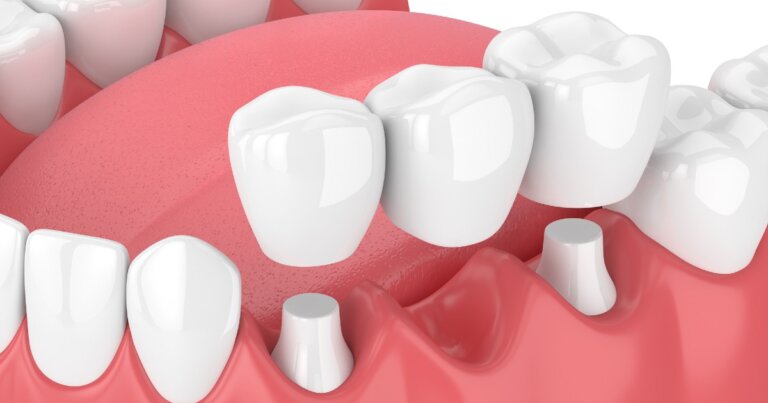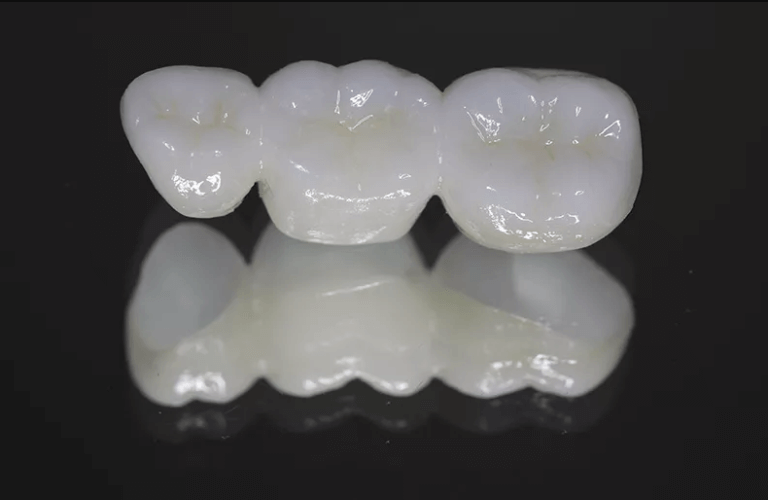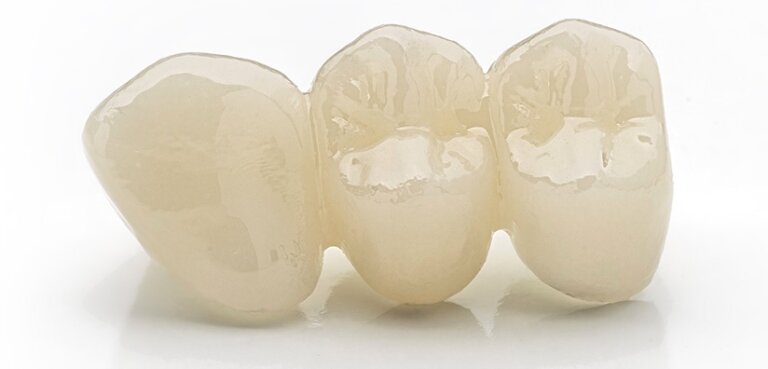Zirconia Dental Bridge

What Is A Zirconia Dental Bridge?
A Zirconia dental bridge is a popular restorative option for individuals missing one or more teeth. Known for its exceptional strength, natural aesthetics, and biocompatibility, zirconia bridges are made from zirconium oxide, a ceramic material stronger than porcelain and some metal alloys. This advanced material mimics the appearance of natural teeth and resists wear, staining, and chipping.
Before deciding on whether A Zirconia Dental Bridge are right for you, there are some things you should know:
- Who Needs A Zirconia Dental Bridge?
- Benefits Of A Zirconia Dental Bridge
- Alternative Treatments To A Zirconia Dental Bridge
- How Much Does A Zirconia Dental Bridge Cost?
- Steps In The Zirconia Dental Bridge Procedure
- Frequently Asked Questions About Zirconia Dental Bridges
If you have any further questions about A Zirconia Dental Bridge or other dental services offered at Atlas Dental, please contact us.

Free phone consultation
Are you missing teeth and have questions about Dental Bridges? Schedule a free phone consultation with our GTA dentist.

5 star google reviews
Our patients love us! See why people are choosing Atlas Dental for Dental Bridges.

Book Emergency Bridge visit online
Have a problem with your Dental Bridge? Book An Emergency Dental Appointment Online.
Who Needs A Zirconia Dental Bridge?
A Zirconia Dental Bridge can be a suitable solution for individuals who are facing the challenges posed by a missing tooth and are seeking an effective way to restore both the functionality and appearance of their smile. If you find yourself in any of the following situations, a Zirconia Bridge might be the right option for you:
- Individuals with Missing Teeth: Replaces one or more missing teeth, preventing adjacent teeth from shifting and maintaining proper alignment.
- Unsuitable Candidates for Dental Implants: Zirconia dental bridges are suitable for those with insufficient bone density or health conditions that rule out implants.
- Enhancing Chewing and Speaking Abilities: A zirconia dental bridge restores your natural chewing and speaking abilities, making daily activities more comfortable and enjoyable.
- Aesthetic Concerns: The bridge is designed to match the color, shape, and size of your natural teeth, ensuring a seamless integration with your smile.
- Preserving Facial Structure: Teeth play a crucial role in supporting facial muscles and maintaining the structure of your face. A zirconia dental bridge helps prevent the sunken appearance that can occur due to tooth loss.
- Boosting Self-Confidence: Missing teeth can lead to a lack of self-confidence and self-consciousness. A zirconia dental bridge restores your smile’s aesthetics, giving you the confidence to interact socially and professionally without worry.
- Holistic and Biocompatible: Zirconia bridges offer a metal-free, biologically-safe dental solution that promotes overall oral health and eliminates risk of metal allergies or sensitivities.
A zirconia dental bridge offers a versatile solution that caters to a range of needs. It’s worth noting that each individual’s dental situation is unique, so consulting with a dentist is essential to determine whether a zirconia dental bridge is the right choice for you. If you have further questions about Zirconia Dental Bridges, please contact us.
Benefits Of A Zirconia Dental Bridge
A Zirconia dental bridge has several advantages that contribute to its widespread use:
- Durability: Highly resistant to fracture and wear, zirconia ensures a long-lasting restoration.
- Natural Aesthetics: Mimics the translucency and color of natural teeth.
- Biocompatibility: Safe for most patients, even those with metal allergies.
- Stain Resistance: Maintains its brilliance over time.
- Preservation of Tooth Structure: Requires minimal reduction of adjacent teeth compared to other options.
- Easy Maintenance: Can be cared for with regular brushing, flossing, and dental visits.
As with any dental procedure, it’s essential to consult with a skilled and experienced dentist to determine whether a zirconia dental bridge is the right option for your specific situation. Your dentist will evaluate your oral health, discuss your goals, and create a personalized treatment plan that aligns with your needs and preferences. If you have further questions about Zirconia Dental Bridges, please contact us.

Alternative Treatments To A Zirconia Dental Bridge
While a zirconia dental bridge offers numerous benefits, it’s important to explore alternative treatments that might better suit your dental needs and preferences when replacing missing teeth. Here are some alternative treatments to consider:
- Dental Implant: A dental implant involves surgically placing a titanium post into the jawbone, which serves as the foundation for a prosthetic tooth. Dental implants provide a permanent and stable solution for single-tooth replacement.
- Maryland Bridge: Also known as a resin-bonded bridge, this option involves attaching a false tooth to the adjacent teeth using metal or porcelain wings. It’s a conservative choice that requires minimal alteration of the adjacent teeth, making it a suitable solution for certain cases.
- Cantilever Bridge: This bridge type involves anchoring the false tooth to only one adjacent tooth. It’s a viable option when there’s only one neighboring tooth available for support.
- Lithium Disilicate Bridge: This type of bridge is crafted from a high-strength ceramic material known as lithium disilicate. It provides natural aesthetics and durability, making it a popular choice for dental restorations.
- Porcelain Fused to Metal Bridge: This bridge consists of a metal framework covered with porcelain. It combines strength with aesthetic appeal, but it may require more tooth reduction compared to other options.
- Gold Bridge: Gold bridges are known for their exceptional longevity and biocompatibility. While they may not be as aesthetically pleasing as other options, some individuals prefer their durability and unique appearance.
- Removable Partial Dentures: If you’re seeking a removable option, partial dentures might be suitable. These dentures are custom-made to fit your mouth and can replace one or more missing teeth. They are held in place by clasps that attach to existing teeth.
Factors such as cost, durability, aesthetics, and your overall oral health will influence which option is the best fit for you. Consulting with your dentist is important to receive personalized recommendations based on your unique situation. If you have further questions about Zirconia Dental Bridges, please contact us.
Cost of Dental Bridge
The price of a Dental Bridges will depend on the number of pontics and retainer. For example, a 3-unit bridge, for example, would cost $1234+550+1234 plus dental lab fee (approximately $600), which would equal $3618. The codes relevant to dental bridges in the Ontario Dental Association’s Suggested Fee Guide appear as follows:
Pontics, Porcelain/Ceramic/Polymer Glass
- 62501 – Pontics, Porcelain/Ceramic/Polymer Glass Fused to Metal: $550 + Dental Lab Fee
Retainers, Porcelain/Ceramic/Polymer Glass
- 67201 – Retainer, Porcelain/Ceramic/Polymer Glass: $1234 + Dental Lab Fee
Dental bridges are sometimes considered a supplementary service by dental insurance plans and may or may not be covered by your dental insurance. Be sure to find out from your dental insurance plan provider how much you are eligible for before going ahead with dental treatment. Your dentist can help you submit an predetermination to your dental insurance.
For patients without dental insurance, Atlas Dental is pleased to offer dental financing through iFinance Dentalcard. Affordable payment plans start at 7.95% for terms of 6 months to 6 years. To learn more about Dentalcard dental treatment financing, follow this link.
Steps In The Zirconia Dental Bridge Procedure
Here’s an overview of the typical zirconia dental bridge procedure:
- Initial Consultation: Evaluation of oral health and suitability for a zirconia bridge.
- Treatment Planning: Personalized plan based on dental needs.
- Tooth Preparation: Adjacent teeth are shaped for the bridge.
- Impressions & Shade Matching: Accurate molds and color selection.
- Temporary Bridge Placement: Protects teeth while the final bridge is made.
- Fabrication: Using advanced CAD/CAM technology, the bridge is crafted to fit perfectly.
- Final Fitting: Adjustments ensure a comfortable and natural bite.
- Placement: The bridge is bonded securely using dental cement.
- Post-Care: Maintain with routine oral hygiene and dental visits.
By following these steps and collaborating closely with your dentist, you can expect to achieve a restored smile that enhances both your appearance and your overall quality of life. If you have further questions about Zirconia Dental Bridges, please contact us.

Frequently Asked Questions About Zirconia Dental Bridges
- How long does a zirconia dental bridge last?
With proper care, a zirconia dental bridge can last 10–15 years or longer. Regular dental check-ups are essential for longevity.
- Is a zirconia dental bridge safe for individuals with metal allergies?
Yes, zirconia is metal-free and biocompatible, making it suitable for patients with metal sensitivities.
- Can a zirconia dental bridge stain over time?
Zirconia is highly stain-resistant, but maintaining good oral hygiene is important to keep it looking its best.
- What is the recovery time after getting a zirconia dental bridge?
Most patients adjust to their new bridge within a few days. Any initial sensitivity usually subsides quickly.
At Atlas Dental, we specialize in providing high-quality zirconia dental bridges tailored to your needs. Contact us to discuss your options. Our experienced team is here to help you achieve a confident and functional smile.

